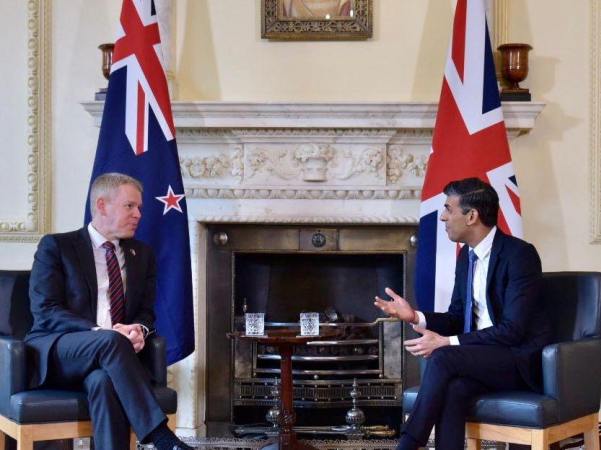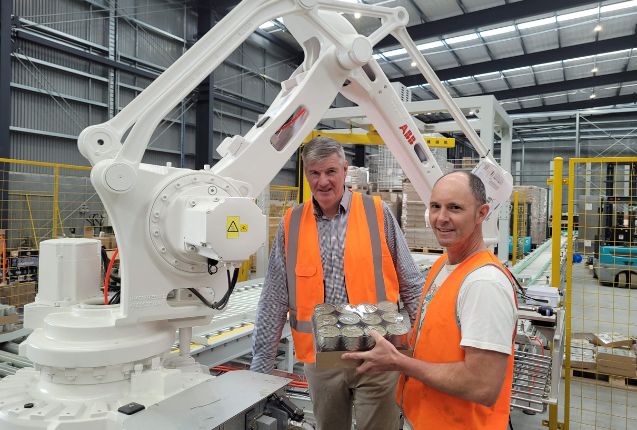New Zealand and the United Kingdom have agreed to bring forward the entry into force of their Free Trade Agreement (FTA) to 31 May 2023, unlocking unprecedented access to the UK market by the end of the month, Prime Minister Chris Hipkins announced.
“This is a gold-standard FTA, reflecting the close relationship between our two countries. The market access outcomes are among the very best New Zealand has secured in any trade deal,” Chris Hipkins said.
“The entry into force of our new trade deal marks a new chapter in the great friendship between our two countries,” UK Prime Minister Rishi Sunak said.
“This deal will unlock new opportunities for businesses and investors across New Zealand and the UK, drive growth, boost jobs, and most importantly build a more prosperous future for the next generation,” Rishi Sunak said.
“From day one New Zealand exporters will save approximately $37 million per year in tariff elimination alone, so the earlier than expected entry into force is a much-needed boost for our exporters right now,” Chris Hipkins said.
“Securing improved trade access for New Zealand exporters is a foreign policy priority for me so it is incredibly pleasing to get the final leg of this FTA over the line and for our exporters to start benefiting from it by the end of this month.
“The UK is New Zealand’s seventh largest trading partner and a crucial market for some of our key exports, so this should really help our economic recovery.
“Ultimately, all customs duties on all products will be eliminated through this FTA – and the vast majority of these will be removed on the very first day, providing a shot in the arm for exporters immediately.
“I want to thank Prime Minister Sunak for his commitment to the FTA and his support for bringing forward its benefits. Our two countries are incredibly close, and the FTA adds a new economic dimension to the bonds that unite us,” Chris Hipkins said.
Minister for Trade and Export Growth Damien O’Connor said the agreement is expected to boost New Zealand’s GDP by up to $1 billion, and expand New Zealand’s goods exports to the UK by over 50 percent.
“From day one 99.5 per cent of current exports will enter the UK duty-free through a combination of tariff elimination and duty-free quotas,” Damien O’Connor said.
“This deal will cut costs for exporters, create opportunities for New Zealand businesses to grow and diversify their trade, and help tackle rising living costs by delivering quality, price-competitive UK imports.
“The FTA is great news for our wine industry, which is currently our biggest exporter to the UK by value earning around $470 million last year. The deal saves exporters at least $25 million in tariffs immediately. The deal also removes tariffs of up to 20 percent on seafood products.
“Major honey exporting regions like Northland, Hawke’s Bay, and the Coromandel will benefit from the removal of the $16 per $100 of product sent to market.
“Our dairy and red meat sectors will have significantly improved access to the UK’s NZ$3 trillion consumer market for the first time in nearly 50 years. We’ve secured excellent tariff free quotas for our dairy and meat producers, which will grow until being fully liberalised by Years 5 and 15 respectively.
“A dedicated Māori Trade and Economic Cooperation Chapter recognises the unique relationship that exists between Māori and the British Crown as original signatories of Te Tiriti o Waitangi, and provides a platform for cooperation on areas of importance to Māori.
“The agreement also includes forward-looking environmental commitments for both parties, incorporating a specific article on climate change and provisions to eliminate environmentally harmful subsidies.
“I’m proud of the work that’s been done to get to this agreement finalised and excited for our exporters who are set to derive the benefits of it very soon,” Damien O’Connor said.
More information on the NZ-UK FTA, including information for exporters and the outcomes for each market, is available at www.mfat.govt.nz/nzukfta .
In addition to the early entry into force of the Free Trade Agreement is the implementation of the upgraded Working Holiday Scheme, which will take effect 29 June (in in the UK) and 1 July (in New Zealand) this year.
In July 2022, an extension of the programme was announced, which would see 5 years added to the age of eligibility for both schemes from 30 to 35 years, an extension of the maximum period of time individuals can stay in New Zealand and the UK respectively, from 2 years (or 23 months in the case of New Zealand) to 3 years, and an extension to the length of time individuals can work, allowing those in the UK and New Zealand respectively to work for the full duration of their 3-year stay.
“Working holiday makers play a vital role in the New Zealand economy. We need their skills to meet workforce demand in industries like tourism, hospitality, agriculture and horticulture,” Chris Hipkins said.
“There are around 3,500 working holiday makers from the UK in New Zealand at the moment and are making a big difference to sectors looking to fill workforce gaps.
“With the changes to the Working Holiday scheme taking effect soon, we would expect this to provide a boost to the interest from UK working holiday makers, providing additional support to the tourism and hospitality industries through winter as we host the FIFA Women’s World Cup from 20 July to 20 August,” Chris Hipkins said.
Fast Facts
- FTA expected to add up to $1 billion to New Zealand’s annual GDP
- Boost New Zealand’s goods exports to the UK by over 50 percent
- From 31 May 99.5 percent of current trade to enter duty-free into UK through combination of tariff elimination and duty-free quotas
- Exporters will save approximately $37 million per year in tariff elimination alone



